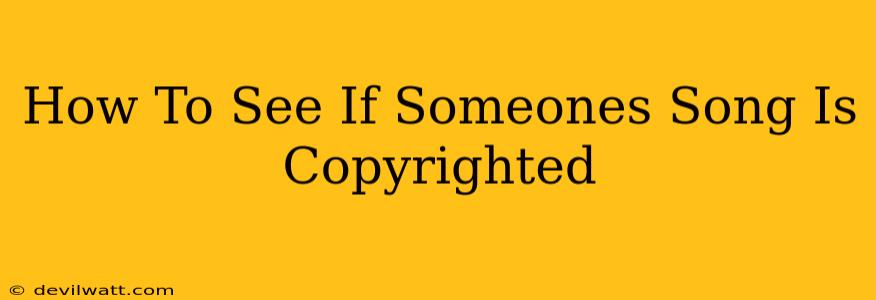Determining if a song is copyrighted can be tricky, but it's crucial for both creators and users. Understanding copyright protects songwriters and performers while preventing unintentional infringement. This guide breaks down how to investigate a song's copyright status.
Understanding Copyright Basics
Before diving into the how-to, let's clarify what copyright means for music. Copyright automatically protects original musical works the moment they're fixed in a tangible form (e.g., recorded or written). This protection grants the copyright holder exclusive rights to:
- Reproduce the work: Making copies of the song.
- Prepare derivative works: Creating new works based on the song (e.g., remixes).
- Distribute copies: Selling or giving away copies of the song.
- Perform the work publicly: Playing the song in a public setting.
- Display the work publicly: Showing the song's lyrics or sheet music publicly.
This protection lasts for a significant period, generally the life of the author plus 70 years (or longer for corporate works).
Methods to Check for Copyright
Unfortunately, there's no single, foolproof database listing every copyrighted song. However, several methods can help you determine the likelihood of a song being protected:
1. Searching Copyright Databases
While a comprehensive global database doesn't exist, you can search specific databases:
-
The United States Copyright Office (USCO): For songs registered in the US, the USCO website is a good starting point. You can search by title, author, or registration number. Keep in mind that registration isn't mandatory for copyright to exist; an unregistered work is still protected.
-
Other National Copyright Offices: If the song originates from another country, check the relevant national copyright office's database. These databases vary in accessibility and search functionality.
-
Performing Rights Organizations (PROs): PROs like ASCAP, BMI, and SESAC license the public performance of music. While they don't necessarily confirm copyright, a song's presence in their database suggests it's likely copyrighted and managed by a rights holder.
2. Examining the Song's Metadata
Digital music files often contain metadata, including copyright information. However, this information isn't always accurate or complete. Check for details such as:
- Copyright notice: Look for a © symbol followed by the copyright holder's name and year.
- Publisher information: The publisher's name can offer a clue.
3. Using Online Search Engines
A general web search using the song title and artist can uncover relevant information. Look for official websites, news articles, or social media posts related to the song that might mention copyright details or licensing.
4. Consulting a Copyright Lawyer
For complex cases or when you need definitive legal advice, contacting a copyright lawyer is the best option. They can provide expert guidance on copyright law and help you navigate the intricacies of music copyright.
What to Do If You Find a Copyrighted Song
If your research indicates a song is copyrighted, using it without permission can lead to legal consequences, including copyright infringement lawsuits. Always obtain the necessary licenses or permissions before using copyrighted music in your projects, performances, or other ventures.
Copyright and Fair Use
A crucial aspect of copyright is the concept of "fair use." Fair use allows limited use of copyrighted material for purposes like criticism, commentary, news reporting, teaching, scholarship, or research. However, fair use is a complex legal doctrine, and whether your use qualifies depends on several factors. It's essential to carefully consider all aspects of fair use before relying on this exception.
By employing these strategies, you'll significantly increase your chances of determining the copyright status of a song. Remember, respecting copyright is crucial for supporting artists and fostering a healthy creative environment.

